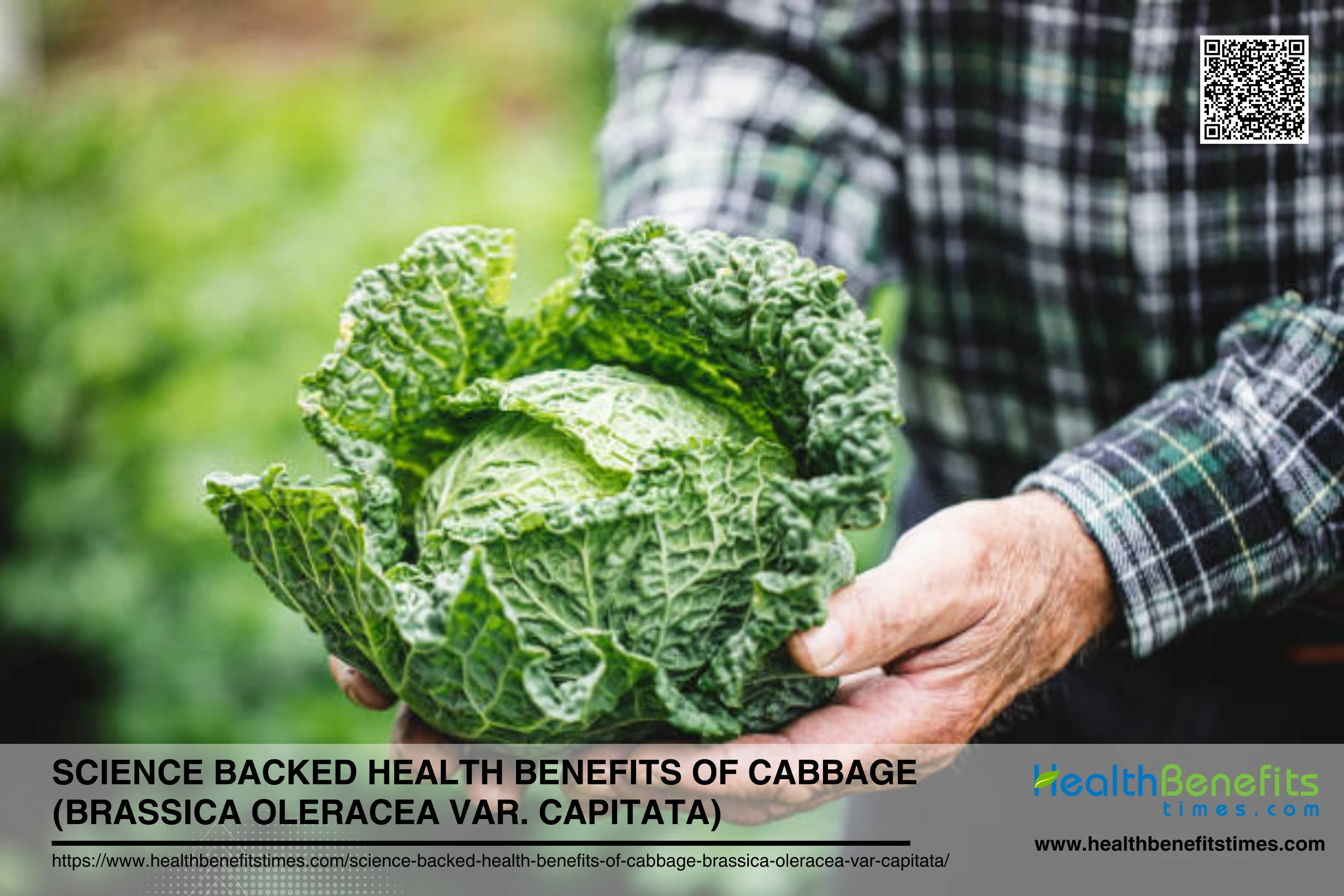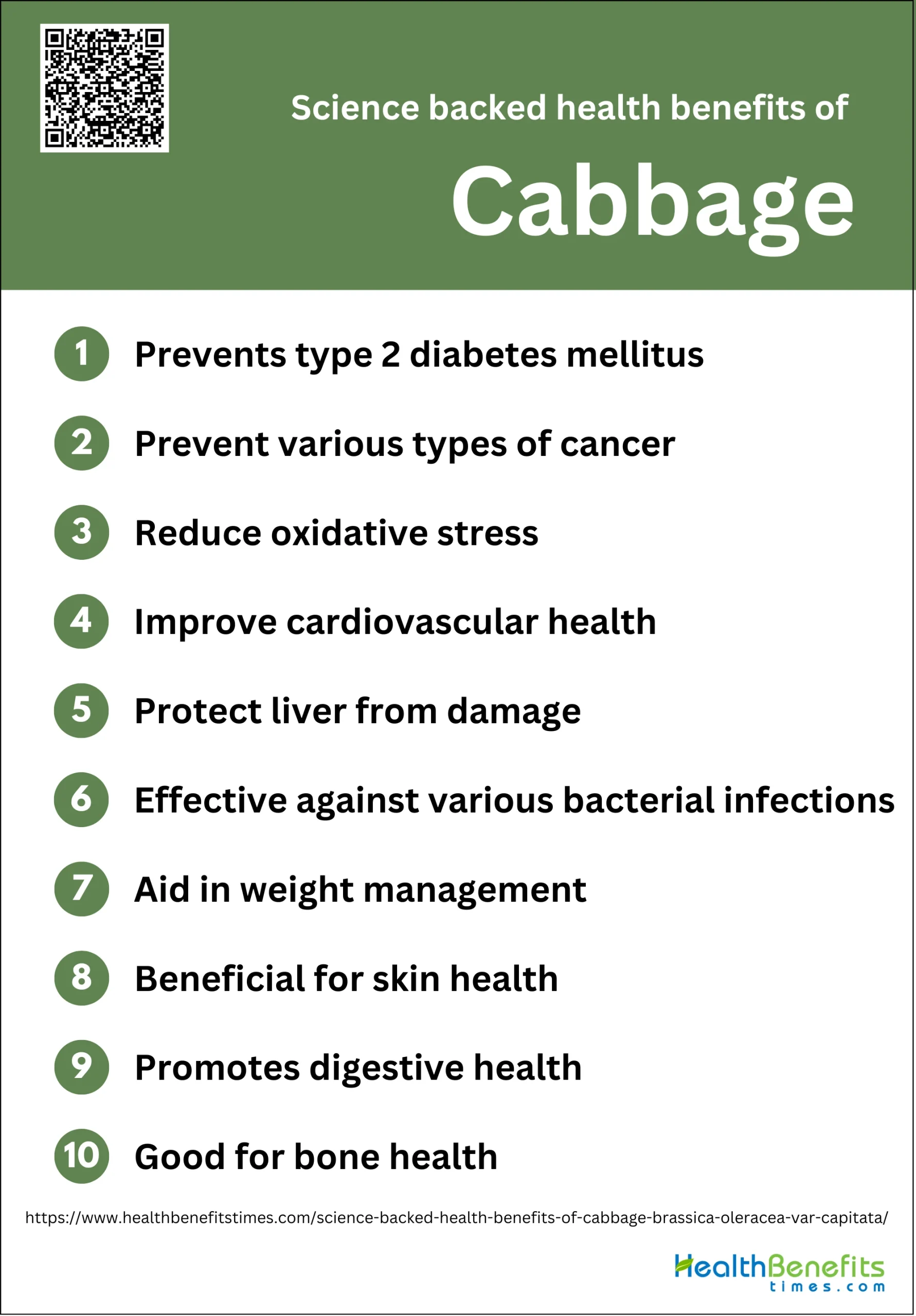- Cabbage is a nutritional, medicinal, anticancer, antioxidant, anti-inflammatory, cardio-protective, anti-diabetes, pest-resistant, genome-studied.
- Cabbage is nutritious, anticancer, antioxidant, anti-inflammatory, diabetes-preventing, oxidative stress-reducing.
- Cabbage consists of antioxidants, reduce inflammation, lower cholesterol, control blood pressure, prevent heart disease.
- Cabbage has low-calorie, high-fiber, nutrient-dense, aids weight management, promotes satiety.
- Cabbage is versatile, low-calorie, high-fiber, enhances satiety, supports weight management.
- Cabbage can cause gas, affect thyroid, allergies, interacts with medications.
 Cabbage (Brassica oleracea var. capitata) is more than just a humble vegetable found in your local grocery store; it is a powerhouse of nutrients with a myriad of science-backed health benefits. This cruciferous vegetable, known for its dense, leafy heads, has been a staple in various cuisines around the world for centuries. Recent research has shed light on its impressive array of vitamins, minerals, and antioxidants, making it a valuable addition to any diet. From boosting immune function to reducing inflammation and even offering potential cancer-fighting properties, cabbage stands out as a versatile and health-promoting food. In this article, we will delve into the numerous health benefits of cabbage, supported by scientific evidence, and explore why this vegetable deserves a prominent place on your plate.
Cabbage (Brassica oleracea var. capitata) is more than just a humble vegetable found in your local grocery store; it is a powerhouse of nutrients with a myriad of science-backed health benefits. This cruciferous vegetable, known for its dense, leafy heads, has been a staple in various cuisines around the world for centuries. Recent research has shed light on its impressive array of vitamins, minerals, and antioxidants, making it a valuable addition to any diet. From boosting immune function to reducing inflammation and even offering potential cancer-fighting properties, cabbage stands out as a versatile and health-promoting food. In this article, we will delve into the numerous health benefits of cabbage, supported by scientific evidence, and explore why this vegetable deserves a prominent place on your plate.
What is Cabbage ?
Cabbage is a widely cultivated cruciferous vegetable known for its significant nutritional and medicinal properties. Originating from wild types found along the European coasts of the Atlantic and the Mediterranean, cabbage has been domesticated since ancient times and was used both as a food source and for medicinal purposes in civilizations such as ancient Egypt and the Roman Empire. It is rich in dietary fiber, vitamins, and beta-carotene, and has been shown to possess various health-promoting phytochemicals, including glucosinolates, polyphenols, and vitamins, which contribute to its anticancer, antioxidant, anti-inflammatory, and cardioprotective effects. Cabbage is also noted for its functional properties in managing and preventing type 2 diabetes due to its high content of bioactive compounds that help regulate glucose homeostasis and reduce oxidative stress and obesity. Additionally, cabbage cultivation faces challenges such as pest infestations and head-splitting, which can significantly impact yield and quality. Innovative agricultural practices, such as the use of Agronets, have been shown to effectively reduce pest damage and increase yields. Furthermore, advanced genomic and transcriptomic studies have provided valuable insights into the genetic makeup and molecular biology of cabbage, facilitating future research and breeding programs aimed at improving its resilience and nutritional value.
Nutritional Profile of Cabbage
Cabbage boasts an impressive nutritional profile, packing a powerful punch of essential vitamins, minerals, and antioxidants into its crisp leaves. This cruciferous vegetable is low in calories but high in nutrients, making it an excellent addition to a healthy diet. A single cup (89 grams) of raw green cabbage contains only 22 calories while providing significant amounts of vitamins C and K, as well as folate, manganese, and fiber. The nutritional content can vary slightly between different cabbage varieties, with red cabbage often containing higher levels of certain antioxidants like anthocyanins.
Vitamins and Minerals:
Cabbage is a rich source of various vitamins and minerals that are crucial for maintaining optimal health. It contains notable amounts of vitamin C, vitamin K, folate, vitamin B6, calcium, potassium, magnesium, and manganese. These nutrients play essential roles in supporting immune function, bone health, blood clotting, and overall cellular processes in the body. Additionally, cabbage provides smaller quantities of other important minerals such as iron, zinc, and phosphorus, contributing to its well-rounded nutritional profile.
Vitamin C:
One of the standout nutrients in cabbage is vitamin C, with a single cup of raw cabbage providing about 36% of the daily recommended value. This powerful antioxidant plays a crucial role in supporting immune function, promoting skin health, and aiding in the absorption of iron from plant-based foods. Vitamin C also acts as a potent antioxidant, helping to protect cells from damage caused by free radicals and potentially reducing the risk of chronic diseases. It’s worth noting that cooking methods can affect vitamin C content, with some loss occurring during the cooking process.
Vitamin K:
Cabbage is an excellent source of vitamin K, with one cup of raw cabbage containing approximately 56% of the daily recommended value. This fat-soluble vitamin is essential for proper blood clotting and plays a vital role in maintaining bone health. Vitamin K helps activate proteins involved in bone metabolism and may help reduce the risk of osteoporosis. Regular consumption of cabbage, particularly green varieties, can contribute significantly to meeting daily vitamin K requirements and supporting overall bone and cardiovascular health.
Folate:
Cabbage is a good source of folate, also known as vitamin B9, with one cup providing about 10% of the daily recommended value. Folate is crucial for DNA synthesis, cell division, and the formation of red blood cells. It’s particularly important during pregnancy for fetal development and may help reduce the risk of certain birth defects. Regular consumption of folate-rich foods like cabbage can contribute to maintaining healthy folate levels in the body, supporting overall health and potentially reducing the risk of certain chronic diseases.
Calcium:
While not as high in calcium as some dairy products, cabbage does contain a modest amount of this essential mineral. One cup of cooked cabbage provides about 4% of the daily recommended value of calcium. Calcium is crucial for maintaining strong bones and teeth, as well as supporting proper muscle and nerve function. The calcium in cabbage, combined with its vitamin K content, can contribute to overall bone health when consumed as part of a balanced diet rich in various calcium sources.
Macronutrients:
Cabbage is primarily composed of water and carbohydrates, with small amounts of protein and fat. A cup of raw cabbage contains about 5 grams of carbohydrates, 1 gram of protein, and negligible fat. The carbohydrates in cabbage are mainly in the form of fiber and natural sugars. Despite its low macronutrient content, cabbage provides essential vitamins, minerals, and antioxidants, making it a nutrient-dense food that can contribute to a well-balanced diet without adding significant calories or macronutrients.
Low in Calories:
One of the most appealing aspects of cabbage from a nutritional standpoint is its low calorie content. A cup of raw cabbage contains only about 22 calories, making it an excellent choice for those looking to manage their weight or reduce calorie intake. Despite its low calorie content, cabbage is rich in nutrients and fiber, which can help promote feelings of fullness and satisfaction. This combination of low calories and high nutrient density makes cabbage an ideal food for weight management and overall health.
High in Fiber:
Cabbage is an excellent source of dietary fiber, with one cup of raw cabbage providing about 2 grams of fiber. This fiber content contributes to the vegetable’s many health benefits, including improved digestion, reduced constipation, and better gut health. The soluble fiber in cabbage can help feed beneficial gut bacteria, potentially improving the balance of microbes in the digestive system. Additionally, the high fiber content can help promote feelings of fullness, aid in weight management, and may contribute to lower cholesterol levels and improved heart health
Science backed health benefits of Cabbage
Cabbage is often overlooked in the world of superfoods, but this humble vegetable packs a powerful nutritional punch. Loaded with essential vitamins, minerals, and antioxidants, cabbage offers a wide array of health benefits that are backed by scientific research. From boosting your immune system to improving digestion and even potentially reducing the risk of certain chronic diseases, cabbage is a versatile and affordable addition to any diet. In this article, we’ll explore the top science-backed health benefits of cabbage, shedding light on why this cruciferous vegetable deserves a spot on your plate.
1. Prevents type 2 diabetes mellitus
Cabbage shows promising potential in preventing and managing type 2 diabetes mellitus. Cabbage contains bioactive compounds with multi-target effects on glucose homeostasis regulation. Its high fiber content and low glycemic index help regulate blood sugar levels and improve insulin sensitivity. Cabbage is rich in antioxidants like polyphenols and anthocyanins, which can reduce oxidative stress and inflammation associated with diabetes. Diets high in cabbage and other cruciferous vegetables are associated with a lower risk of developing type 2 diabetes. Additionally, cabbage may help protect against diabetes-related complications by supporting kidney function and cardiovascular health.
What Research Says?
- Cabbage varieties (green, white, and red) contain high levels of bioactive compounds that help regulate glucose homeostasis and reduce organ damage caused by T2DM complications.
- Red cabbage has been shown to decrease oxidative stress and improve metabolic profiles in diabetic rats, suggesting its potential as a natural antioxidant therapy.
- Diets high in bitter and strong-tasting vegetables, including cabbages, significantly improve insulin sensitivity, body fat mass, and blood pressure in T2DM patients compared to mild and sweet-tasting vegetables.
- Korean traditional Baechu (Chinese cabbage) kimchi has demonstrated antidiabetic effects in a high-fat diet-fed, streptozotocin-induced T2DM rat model, improving insulin concentrations and glucose tolerance.
- Increased consumption of green leafy vegetables, including cabbage, may reduce the incidence of T2DM, although the overall effect is not consistent across all studies.
2. Prevent various types of cancer

Cabbage plays a significant role in cancer prevention due to its rich content of glucosinolates, which are sulfur-containing compounds. When consumed, these glucosinolates are broken down into bioactive compounds such as indoles and isothiocyanates, which have been shown to inhibit the development of cancer in various organs, including the bladder, breast, colon, liver, lung, and stomach. These compounds help protect cells from DNA damage, inactivate carcinogens, and induce apoptosis (programmed cell death) in cancer cells, thereby preventing tumor growth and metastasis. High consumption of cabbage and other cruciferous vegetables is associated with a lower risk of several types of cancer, particularly lung, stomach, colon, and rectal cancers.
What Research Says?
- Cabbage contains glucosinolates, which are converted into isothiocyanates in the intestinal tract. These compounds have been shown to possess anticarcinogenic properties.
- Cabbage is rich in various phytochemicals such as glucosinolates, polyphenols, and vitamins, which contribute to its anticancerogenic, antioxidant, and anti-inflammatory effects.
- Organic cabbage has been found to contain higher levels of certain bioactive compounds compared to conventionally grown cabbage. This includes higher levels of polyphenols in organic sauerkraut juice, which may enhance its anticancer properties.
3. Reduce oxidative stress
Cabbage has demonstrated significant potential in reducing oxidative stress due to its rich phytochemical profile. Cabbage extract can protect against H2O2-induced oxidative stress in cells by suppressing reactive oxygen species (ROS) production and increasing the expression of antioxidant enzymes like superoxide dismutase (SOD), catalase, and glutathione peroxidase. The antioxidant activity of cabbage is attributed to its high content of polyphenols, flavonoids, vitamin C, and glucosinolates. Red cabbage, in particular, exhibits stronger antioxidant capacity compared to other varieties due to its abundant anthocyanin content. In animal studies, red cabbage extract has been shown to ameliorate lipid peroxidation and enhance antioxidant enzyme activities in hypercholesterolemic conditions.
What Research Says?
- Cabbage extracts have been shown to enhance the activity of key antioxidant enzymes such as superoxide dismutase (SOD), catalase (CAT), and glutathione peroxidase (GPx), which help in reducing oxidative stress in various tissues.
- Different varieties of cabbage (red, green, Savoy, Chinese) exhibit varying levels of antioxidant activity, with red cabbage generally showing the highest total antioxidant content.
- The antioxidant properties of cabbage are attributed to its rich phytochemical content, including phenols, flavonoids, and glucosinolates, which contribute to its ability to scavenge free radicals and reduce oxidative stress.
- Cabbage plants increase their antioxidant defenses in response to environmental stressors such as salinity, drought, and temperature extremes, which in turn helps in mitigating oxidative damage.
4. Improve cardiovascular health
Cabbage significantly contributes to cardiovascular health through multiple mechanisms. Rich in antioxidants like vitamin C and anthocyanins, cabbage helps reduce inflammation, a key factor in heart disease. The high potassium content in cabbage aids in controlling blood pressure by counteracting the effects of sodium and relaxing blood vessel walls, thereby reducing hypertension. Additionally, cabbage contains phytosterols and fiber, which help lower LDL cholesterol levels by blocking its absorption in the digestive tract. Regular consumption of cruciferous vegetables, including cabbage, has been linked to a reduced risk of atherosclerosis and improved arterial health, further protecting against heart attacks and strokes.
What Research Says?
- Cabbage has lots of glucosinolates, polyphenols, and vitamins. These help it fight off damage and swelling in the body. They can lower the risk of heart diseases by cutting down on stress and inflammation in our bodies.
- Cabbage extract has been shown to protect against oxidative stress in cardiomyocytes by reducing reactive oxygen species (ROS) production, inhibiting apoptotic responses, and preserving mitochondrial functions.
- Red cabbage has demonstrated the ability to ameliorate dyslipidemia and hepatic injury induced by a cholesterol-rich diet. This is achieved through its potent antioxidant properties, which help balance lipid levels and reduce liver inflammation and necrosis.
5. Protect liver from damage

Cabbage contains bioactive compounds, including glucosinolates, polyphenols, and vitamin C, which exhibit potent antioxidant and anti-inflammatory properties. These compounds help reduce oxidative stress and inflammation in the liver, two key factors in liver damage. Research indicates that cabbage consumption can improve liver enzyme levels, decrease fat accumulation in the liver, and enhance the organ’s detoxification processes. In animal studies, cabbage extract has been found to protect against carbon tetrachloride-induced liver injury by suppressing oxidative stress and promoting the production of antioxidant enzymes. Additionally, cabbage juice has shown promise in mitigating lead-induced liver dysfunction by lowering serum concentrations of liver enzymes and upregulating antioxidant activity in liver tissues.
What Research Says?
- Red cabbage extract has been shown to significantly reduce oxidative stress and lipid imbalances in the liver, demonstrating robust antioxidant properties that protect against hepatic injury induced by a cholesterol-rich diet.
- The administration of red cabbage juice significantly reduced SGPT levels in acetaminophen-induced liver injury, indicating its potential to mitigate drug-induced liver damage.
- Cabbage varieties, including red, green, and white, have been shown to decrease organ damage related to type 2 diabetes complications, including liver damage, due to their high content of bioactive compounds.
6. Effective against various bacterial infections
Cabbage extracts exhibit potent inhibitory effects on both Gram-positive and Gram-negative bacteria, including highly resistant strains. The antibacterial activity is attributed to various bioactive compounds present in cabbage, such as glucosinolates, polyphenols, and anthocyanins. Red cabbage, in particular, has shown remarkable efficacy against multidrug-resistant bacteria, with its extracts creating notable zones of inhibition ranging from 7-20 mm in diameter for various bacterial species. The antibacterial mechanisms of cabbage extracts include disruption of bacterial cell walls, alteration of membrane permeability, and inhibition of biofilm formation.
What Research Says?
- Cabbage extracts, particularly from purple cabbage, exhibit significant antimicrobial activity against Staphylococcus aureus and moderate activity against Bacillus subtilis, but show weak or no activity against fungi and Escherichia coli.
- The bioconverted product of cabbage using Pectobacterium carotovorum pv. carotovorum 21 shows potential anticandidal effects against various Candida species, indicating its broad-spectrum antimicrobial properties.
- Fermented cabbage with Lactobacillus acidophilus and Lactiplantibacillus plantarum demonstrates a dose-dependent inhibition of pro-inflammatory factors such as nitric oxide (NO), PGE2, IL-1β, and TNF-α in LPS-stimulated macrophages, suggesting its potential as an anti-inflammatory agent.
- Cabbage contains various phytochemicals, including alkaloids, flavonoids, organic acids, glucosinolates, and steroids, which contribute to its pharmacological effects such as antidiabetic, anticancer, antihypertensive, anticholesterolemic, antioxidant, anti-inflammatory, antibacterial, and anti-obesity activities.
7. Aid in weight management
Cabbage is an excellent aid in weight management due to its unique nutritional profile and low calorie content. With only 22-25 calories per cup, cabbage allows for generous portions without significantly impacting daily caloric intake. Its high fiber content, approximately 2-2.5 grams per cup, promotes satiety and helps regulate digestion, potentially reducing overall food consumption. Cabbage is also rich in water, which contributes to feelings of fullness and supports hydration. The vegetable’s abundance of vitamins and minerals, particularly vitamin C, may assist in fat oxidation and metabolism. Additionally, cabbage can be incorporated into various low-calorie dishes like soups and salads, making it easier to adhere to a calorie-restricted diet. While cabbage alone is not a magic solution for weight loss, its inclusion in a balanced diet, combined with regular exercise, can significantly support weight management efforts. It’s important to note that sustainable weight loss requires a holistic approach, and cabbage should be part of a varied, nutrient-rich eating plan rather than relied upon as a sole weight loss strategy.
What Research Says?
- Cabbage contains bioactive compounds that exhibit anti-obesity effects by influencing metabolic pathways and reducing oxidative stress, which are underlying factors in obesity and type 2 diabetes.
- Red cabbage, in particular, is rich in anthocyanins and antioxidants, which help mitigate oxidative stress and inflammation. This contributes to its potential in managing dyslipidemia and protecting against hepatic injury induced by high cholesterol diets.
8. Beneficial for skin health

Cabbage offers numerous benefits for skin health due to its rich nutrient profile and bioactive compounds. The vegetable is packed with antioxidants like vitamin C, anthocyanins, and sulforaphane, which help combat oxidative stress and reduce inflammation in the skin. These antioxidants also contribute to collagen production, promoting skin elasticity and reducing the appearance of wrinkles. Cabbage’s high vitamin K content supports skin healing, while its sulfur compounds aid in synthesizing keratin, essential for healthy skin, hair, and nails. Topical application of cabbage extract has shown promise in treating skin conditions like eczema, psoriasis, and acne due to its anti-inflammatory and antimicrobial properties. Additionally, the vegetable’s high water content helps hydrate the skin, while its detoxifying properties assist in cleansing and purifying the skin, potentially leading to a clearer complexion. Regular consumption or topical application of cabbage may contribute to overall skin health, promoting a radiant and youthful appearance.
What Research Says?
- Cabbage methanol extract (MEBO) significantly reduces ear swelling, erythema, epidermal hyperplasia, and immune cell infiltration in mice with contact dermatitis. It also lowers levels of pro-inflammatory cytokines such as TNF-alpha, IFN-gamma, IL-6, and MCP-1.
- Topical application of purple cabbage ethanol cream extract prevents the decrease of dermal collagen in male Wistar rats exposed to UV-B radiation. Higher concentrations of the extract (20%) showed similar effectiveness to sunblock in maintaining collagen levels.
- White cabbage contains health-promoting phytochemicals like glucosinolates, polyphenols, and vitamins, which contribute to its antioxidant, anti-inflammatory, and potentially anticancer properties.
9. Promotes digestive health
Cabbage is highly beneficial for digestive health due to its rich fiber content and various bioactive compounds. The vegetable is packed with both insoluble and soluble fibers, which play crucial roles in maintaining a healthy digestive system. Insoluble fiber adds bulk to stool and promotes regular bowel movements, thereby preventing constipation and supporting overall gut health. Soluble fiber, on the other hand, serves as a prebiotic, nourishing beneficial gut bacteria such as Bifidobacteria and Lactobacilli, which are essential for a balanced gut microbiome and enhanced immune function. Additionally, cabbage contains compounds like glucosinolates and polyphenols that have anti-inflammatory properties, further aiding in the reduction of gastrointestinal inflammation and the prevention of digestive disorders.
What Research Says?
- Cabbage extracts have shown significant anti-ulcerogenic activity, reducing gastric damage and ulcer formation in animal models. This effect is attributed to its ability to enhance anti-inflammatory and antioxidant activities, preserve mucosal integrity, and inhibit gastric acid secretion.
- Cabbage contains bioactive compounds such as glucosinolates, polyphenols, and vitamins, which exhibit strong antioxidant and anti-inflammatory effects. These properties contribute to its protective role against gastric injuries and other digestive disorders.
- Cabbage is rich in phytonutrients, including glucosinolates, flavonoids, and vitamins, which contribute to its health-promoting properties. These compounds are crucial for its anti-inflammatory, antioxidant, and gastroprotective effects.
10. Good for bone health

This cruciferous vegetable is an excellent source of vitamin K, with one cup of cooked cabbage providing about 85% of the recommended daily value. Vitamin K plays a crucial role in bone metabolism and helps maintain bone density by promoting calcium absorption and reducing calcium loss. Additionally, cabbage contains small but valuable amounts of other bone-supporting nutrients like calcium, magnesium, and zinc. The high vitamin C content in cabbage, particularly in red varieties, supports collagen production, which is essential for bone structure. Furthermore, cabbage’s anti-inflammatory properties, attributed to its antioxidants and phytochemicals, may help protect against bone loss associated with chronic inflammation.
What Research Says?
- Cabbage leaf juice has been shown to stabilize bone mass in postmenopausal women, suggesting its potential as a preventive measure against bone density loss.
- Diets supplemented with red cabbage, along with other functional foods like soy bean flour and broccoli, improved bone health markers in osteoporotic rats. The combination of these foods showed the highest recovery in bone parameters, indicating that red cabbage can be part of a functional food mix to prevent bone loss.
Ways to Incorporate Cabbage into Your Diet
Cabbage is a versatile vegetable that can be easily incorporated into your diet in various ways. Try adding shredded raw cabbage to salads or slaws for a crunchy texture. Use cabbage leaves as a low-carb wrap alternative for sandwiches or stuffed cabbage rolls. Include chopped cabbage in soups, stews, and stir-fries for added nutrition. Experiment with different cabbage varieties like Napa, Savoy, or red cabbage to add variety to your meals. Roast cabbage wedges with olive oil and spices for a simple side dish. For a quick and healthy snack, make baked cabbage chips seasoned with your favorite herbs and spices.
Raw
Consuming raw cabbage offers numerous health benefits due to its high nutritional content. Raw cabbage is an excellent source of vitamins C and K, fiber, and antioxidants. The high fiber content aids digestion and promotes feelings of fullness, which can support weight management. Raw cabbage also contains enzymes that help break down food, potentially improving nutrient absorption. Additionally, the crunchy texture of raw cabbage can stimulate saliva production, which is beneficial for oral health. Incorporating raw cabbage into your diet through salads or as a crunchy snack can be an excellent way to boost your intake of essential nutrients while enjoying its crisp texture.
Salads
Cabbage-based salads are a delicious and nutritious way to incorporate this vegetable into your diet. Shred raw cabbage finely and combine it with other vegetables like carrots, bell peppers, and onions for a colorful and crunchy slaw. Add a tangy dressing made with vinegar, olive oil, and herbs to enhance the flavor. For a more substantial salad, include protein sources like grilled chicken, tofu, or chickpeas. Experiment with different cabbage varieties, such as red cabbage for added color and nutritional benefits. Cabbage salads are not only low in calories but also rich in fiber, vitamins, and antioxidants, making them an excellent choice for a healthy meal or side dish.
Smoothies
While less common, incorporating cabbage into smoothies can be a creative way to boost your nutrient intake. Start with a small amount of finely chopped cabbage and gradually increase as you become accustomed to the taste. Combine cabbage with sweeter fruits like apples, pineapples, or berries to balance the flavor. Add a handful of spinach or kale for extra green power. Include a source of healthy fats like avocado or nut butter to improve nutrient absorption. Blend with your choice of liquid, such as water, coconut water, or plant-based milk. Cabbage smoothies can be an excellent way to consume raw cabbage, providing a concentrated dose of vitamins, minerals, and antioxidants in an easily digestible form.
Cooked
Cooking cabbage can enhance its flavor and make it more palatable for some people. Different cooking methods can significantly impact the nutrient retention in cabbage. When cooking cabbage, it’s generally best to use methods that involve less water and shorter cooking times to preserve nutrients. Cooked cabbage can be incorporated into various dishes such as soups, stews, stir-fries, and casseroles. It can also be used as a side dish, sautéed with garlic and herbs, or braised with other vegetables. Experiment with different seasonings and cooking techniques to find your preferred way of enjoying cooked cabbage.
Steamed
Steaming is one of the best cooking methods for preserving nutrients in cabbage. This gentle cooking technique helps retain more vitamin C and antioxidants compared to other methods like boiling. To steam cabbage, cut it into wedges or shred it, then place it in a steamer basket over boiling water. Steam for about 5-7 minutes or until tender-crisp. Steamed cabbage can be seasoned with salt, pepper, and a drizzle of olive oil or butter for added flavor. It makes an excellent side dish or can be used as a base for other recipes. Steaming not only preserves nutrients but also maintains the cabbage’s crisp texture and mild flavor.
Stir-fried
Stir-frying is a quick and flavorful way to cook cabbage while retaining many of its nutrients. This method involves cooking thinly sliced or shredded cabbage in a small amount of oil over high heat for a short time. Stir-frying can help preserve more nutrients compared to boiling, and it also offers cardiovascular benefits when using healthy oils like olive oil. To stir-fry cabbage, heat oil in a wok or large skillet, add sliced cabbage and any other desired vegetables or proteins, and cook while stirring constantly for 3-5 minutes. Season with soy sauce, garlic, ginger, or your favorite spices. Stir-fried cabbage makes a great addition to Asian-inspired dishes or can be enjoyed as a simple side.
Fermented
Fermenting cabbage is an excellent way to enhance its nutritional value and create probiotic-rich foods. The fermentation process increases the bioavailability of nutrients in cabbage and creates beneficial probiotics that support gut health. Fermented cabbage products like sauerkraut and kimchi offer unique health benefits, including improved digestion, boosted immune system, and potential cancer-fighting properties. The lactic acid bacteria produced during fermentation may help inhibit the growth of harmful bacteria in the gut. Regular consumption of fermented cabbage has been associated with various health benefits, including improved digestion, enhanced immunity, and potential cardiovascular benefits.
Sauerkraut
Sauerkraut, a popular fermented cabbage product, offers numerous health benefits. It’s an excellent source of probiotics, which can aid digestion and boost the immune system. Sauerkraut is rich in fiber, vitamins (especially vitamin C and K), and minerals. The fermentation process enhances the bioavailability of these nutrients, making them easier for your body to absorb. Regular consumption of sauerkraut may help improve gut health, reduce inflammation, and support heart health. To incorporate sauerkraut into your diet, use it as a condiment on sandwiches or hot dogs, add it to salads, or enjoy it as a side dish. Remember that sauerkraut can be high in sodium, so consume it in moderation, especially if you’re watching your salt intake.
Kimchi
Kimchi, a traditional Korean fermented cabbage dish, is packed with health benefits. It’s a rich source of probiotics, vitamins, and minerals that can support gut health, boost immunity, and potentially aid in weight management. The fermentation process enhances the nutritional profile of the vegetables used, creating beneficial enzymes, B-vitamins, and various strains of probiotic bacteria. Regular consumption of kimchi may help improve digestion, reduce inflammation, and support heart health. Some studies suggest it may also have potential benefits for blood sugar management and cognitive function. To incorporate kimchi into your diet, try it as a side dish, add it to stir-fries or fried rice, use it as a condiment in sandwiches or burgers, or mix it into scrambled eggs for a flavorful breakfast.
Potential Side Effects and Considerations
Digestive Issues
Consuming cabbage, especially in large amounts or raw form, may cause digestive discomfort in some individuals. Cabbage contains raffinose, a complex sugar that can be difficult for the human digestive system to break down. This can lead to gas, bloating, and abdominal pain, particularly in people with sensitive digestive systems or conditions like irritable bowel syndrome (IBS). To minimize these effects, consider cooking cabbage thoroughly or introducing it gradually into your diet to allow your digestive system to adjust.
Thyroid Concerns
Cabbage contains goitrogens, substances that can interfere with thyroid function by inhibiting iodine uptake. While moderate consumption of cabbage is generally safe for most people, those with existing thyroid conditions, particularly hypothyroidism, should be cautious. Cooking cabbage can help reduce its goitrogenic properties. If you have a thyroid condition, consult with your healthcare provider about the appropriate amount of cabbage to include in your diet.
Allergies
Although rare, some individuals may be allergic to cabbage or other members of the Brassicaceae family. Symptoms of a cabbage allergy can range from mild (such as itching or hives) to severe (including difficulty breathing or anaphylaxis). If you experience any allergic reactions after consuming cabbage, discontinue use and consult an allergist for proper diagnosis and management.
Medication Interactions
Cabbage, particularly when consumed in large amounts, may interact with certain medications. It can affect blood sugar levels, potentially interfering with diabetes medications. Additionally, the high vitamin K content in cabbage may reduce the effectiveness of blood-thinning medications like warfarin. If you’re taking any medications, especially for diabetes or blood clotting disorders, consult your healthcare provider before significantly increasing your cabbage intake.
Conclusion
In conclusion, cabbage is a nutritional powerhouse that offers a wide array of health benefits backed by scientific research. From its potential to prevent type 2 diabetes and various types of cancer to its ability to reduce oxidative stress, improve cardiovascular health, and aid in weight management, cabbage proves to be a versatile and valuable addition to any diet. Its rich content of vitamins, minerals, fiber, and bioactive compounds contributes to its impressive health-promoting properties. Whether consumed raw, cooked, or fermented, cabbage can be easily incorporated into various dishes, making it a convenient and affordable way to boost overall health. While some individuals may need to consider potential side effects or interactions, for most people, regular consumption of cabbage as part of a balanced diet can significantly contribute to improved well-being and disease prevention.
ADDITIONAL RESOURCES
Here is a list of US organizations, along with their short descriptions and URLs, related to research on vegetables:
1. American Society for Horticultural Science (ASHS)
ASHS is dedicated to promoting and encouraging scientific research and education in horticulture, including vegetable crops, to enhance and disseminate knowledge on plant biology.
2. The Samuel Roberts Noble Foundation
This foundation conducts research to improve agricultural productivity, including vegetable crop research focused on breeding, genetics, and sustainable practices.
Recommendations for books on Cabbage
Here are some recommended books on research related to cabbage, along with links to access them:
1. “Cabbage and Cauliflower: Production and Varieties” by R.P. Sharma
This book covers the production practices, varietal information, and management of cabbage and cauliflower, providing in-depth research and insights for better crop yields.
2. “Breeding Vegetable Crops” by Mark J. Bassett
This comprehensive book includes chapters on the breeding of various vegetable crops, including cabbage. It covers genetic improvement, hybridization, and modern breeding techniques.
3. “Cabbage: A Valuable Crop for Sustainable Agriculture” edited by K. V. Peter
This book explores the importance of cabbage in sustainable agriculture. It includes research on cultivation practices, pest management, and the nutritional value of cabbage.
4. “Vegetable Brassicas and Related Crucifers” by Geoffrey R. Dixon
This book delves into the botany, genetics, and cultivation of vegetable brassicas, including cabbage. It provides comprehensive research on the breeding and production of these crops.
FAQS
- What are the primary nutrients found in cabbage?
Cabbage is rich in essential nutrients, including vitamin C, vitamin K, fiber, folate, potassium, and manganese. It also contains small amounts of vitamin A, iron, and riboflavin.
- How does cabbage support digestive health?
Cabbage is high in fiber, which aids in digestion by promoting regular bowel movements and preventing constipation. Fermented cabbage, like sauerkraut and kimchi, contains probiotics that support a healthy gut microbiome.
- Can cabbage help reduce inflammation?
Yes, cabbage contains several anti-inflammatory compounds, including antioxidants like polyphenols and sulfur compounds. These help reduce chronic inflammation, which is linked to various diseases such as heart disease and cancer.
- How does cabbage benefit heart health?
Cabbage supports heart health through its high content of potassium, which helps regulate blood pressure, and antioxidants like anthocyanins that reduce inflammation and prevent plaque buildup in arteries.
- Does cabbage have cancer-preventive properties?
Cabbage contains glucosinolates, sulfur-containing compounds that are converted into cancer-fighting substances during digestion. These compounds, along with antioxidants like vitamin C and anthocyanins, may help reduce the risk of certain cancers, including colorectal and lung cancer.
- How does cabbage boost the immune system?
Cabbage is rich in vitamin C, a powerful antioxidant that boosts the immune system by protecting cells from damage and enhancing the body’s ability to fight off infections.
- Can cabbage improve bone health?
Cabbage is an excellent source of vitamin K, which is essential for bone health as it helps in the formation of bone proteins and prevents bone loss. Regular consumption of cabbage can contribute to stronger bones and reduce the risk of osteoporosis.
- Is cabbage beneficial for weight management?
Yes, cabbage is low in calories and high in fiber, making it a filling food that can help with weight management. Its high water content also helps keep you hydrated and full, reducing overall calorie intake.
- How does cabbage support skin health?
Cabbage is rich in vitamin C and sulfur, both of which are important for skin health. Vitamin C aids in collagen production, which keeps skin firm and youthful, while sulfur helps in detoxification and maintaining healthy skin.
- Are there any precautions to consider when consuming cabbage?
While cabbage is generally safe to eat, it can cause gas and bloating in some individuals. Those on blood thinners should consult their doctor before increasing cabbage intake due to its high vitamin K content, which can interfere with medication. Additionally, individuals with hypothyroidism should avoid excessive consumption of cabbage as it may affect thyroid function.


